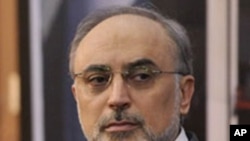Iran's new acting foreign minister, Ali Akbar Salehi, is visiting Iraq on his first trip to an Arab state since taking the job last month. Iran appears to be hoping Salehi, who speaks fluent Arabic and was born in Iraq, will be a bridge to neighboring Arab states, with whom Tehran has strained ties.
Iranian state media played up acting Foreign Minister Ali Akbar Salehi's first visit to the Arab world, stressing Tehran's especially close relationship with its neighbor and former enemy, Iraq.
Ties between Iran and Iraq have grown closer in the years following the 2003 U.S.- led invasion and ouster of Saddam Hussein, despite lingering animosity over a bitter and bloody trench war, punctuated by missile attacks in the 1980s.
Salehi met with Iraqi Prime Minister Nouri al-Maliki and Foreign Minister Hoshyar Zebari, describing what he called Iran's commitment to the process of democracy in Iraq.
During a news conference in Baghdad Salehi said Iran will continue to support the political process in Iraq, based on popular sovereignty and participation of all segments of the population. He adds that Iran will maintain its long-standing and principled stance of assisting the Iraqi people and government.
Several Middle East diplomats and officials, including Egypt's foreign minister and Jordan's prime minister, have visited Baghad since the new Shi'ite-led Iraqi government was sworn in two-weeks ago. Iraq's mostly Sunni-Muslim neighbors appear to be trying to counter Shi'ite Iran's rising influence in the country.
Iraqi Foreign Minister Hoshyar Zebari said he and Salehi discussed an Iranian opposition group Tehran wants expelled from Iraq, the Mujahedin-e-Khalq, the People's Mujahedin. His comments suggest Iraq may be ready to resolve the issue.
He says organizations like the People's Mujahidin are against Iraq's people and interests, and the country's constitution does not allow armed groups to operate on Iraqi soil to commit armed aggression on its neighbors.
The group fought alongside Saddam Hussein's Sunni-dominated regime during the 1980s war. Many of the group's supporters live at a camp north of Baghdad that is surrounded by Iraqi forces.
Former Iranian President Abolhassan Bani Sadr thinks Salehi comes to Baghdad with several demands.
He says according to Wikileaks the Iraqis have complained about Iranian meddling in Iraq by the Revolutionary Guards Qod's forces, in counterpoint to Iran's objections to the People's Mujahedin. He says another key issue is likely to be a long-standing Iranian demand Saudi Arabia put an end to what Tehran calls "meddling in Iraq" in exchange for Iran putting a stop to its own meddling.
Analyst Ali Nourizadeh of the Center for Arab and Iranian Studies in London says Iraqi Prime Minister Maliki does not want to antagonize Iran, but wants to show Arab states he is independent.
"In his first government the Arabs looked at him with suspicion and they never trusted him 100 percent, especially the Saudis," said Nourizadeh. "This time I think the situation is totally different. He would draw a line he would not cross to show he is not a puppet of the Iranians."
He says Mr. Maliki belonged to Iraq's Shi'ite Dawa Party, which has traditionally tried to maintain close ties with Arab states and not just Iran.
Iran's New Foreign Minister Visits Iraq to Shore Up Ties










